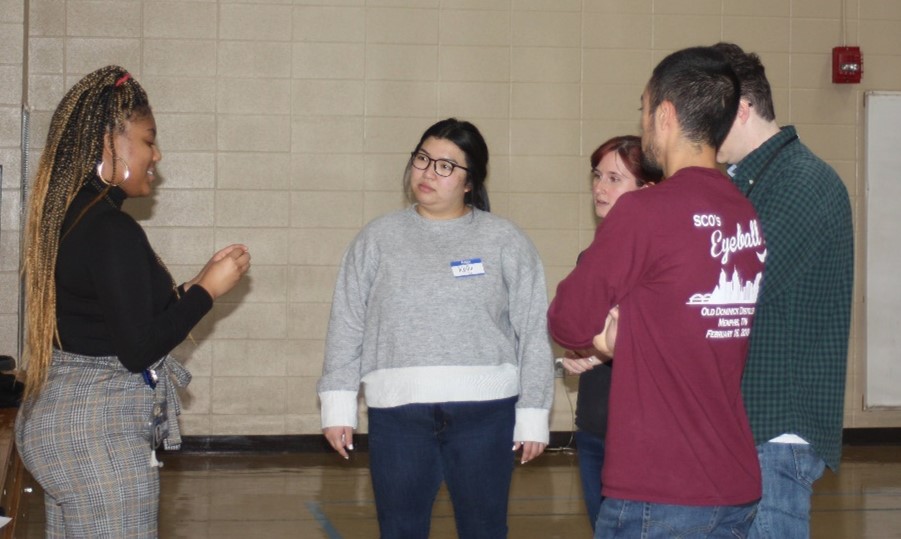Interdisciplinary Collaborations: Interprofessional Education in CSD
by Shelley Ardonne
Speech language pathologists and audiologists often work within interdisciplinary teams which can be challenging if they do not understand what professionals in other healthcare fields do. Dr. Naomi Eichorn, a speech-language pathologist and assistant professor at the University of Memphis, developed an Interprofessional Practice/Interprofessional Education (IPP/IPE) course in 2019, which has reinforced her belief in the value of multidisciplinary collaboration in healthcare. She shared, “Many of the problems we are trying to address in our clinical work are too big and too broad for any single clinician or profession to solve. Coming at these issues collaboratively brings far more expertise and creativity to the table.”

Students from different health programs including 3rd year AuD student, Autumn Barron (L) collaborating in a group activity
In summer 2021, Dr. Eichorn collaborated with Dr. Melissa Zarn (Southern College of Optometry), Dr. Chelsea Renfro (University of Tennessee Health Science Center, College of Pharmacy), and Dr. Tracy Bruen (University of Memphis, College of Health Sciences, Clinical Nutrition Program) to develop the course curriculum and assignments. The course provided multiple opportunities for collaboration between professionals to solve clinical problems that they would encounter in real-life settings. “At its core, the course focused on helping students understand the roles and responsibilities of other professions and how to communicate and collaborate effectively with other members of a healthcare team,” said Dr. Eichorn. In addition, the course included broader themes related to social determinants of health, empathy, bias, and health disparity.

An optometry student having fun with special glasses that mimic optic disorders
The students participated in both online and in-person activities. Initially, students focused on critical healthcare themes in online modules. Then, the cohort was divided into multidisciplinary groups that worked together.
Students across professions worked through two related pediatric case studies that required diverse perspectives to address the child’s history and caregiver concerns. Students observed and interacted with caregivers to create a plan of care for the patient at different points in his childhood. The caregivers were played by actors who gave students the chance to apply their knowledge on empathy, health disparities, and cultural humility in a clinical setting.
Weronika Przepiora, a student at Southern College of Optometry, was one of this year’s participants. “As someone who benefits from hands-on learning, I thoroughly enjoyed the simulated patient encounters in this course,” she said of her experience. “I cannot imagine obtaining as much appreciation for other professions and the interprofessional patient interview by reading about it as I did by being an active part of one.” Przepiora noticed that at first, most students assumed that the patient’s concerns stemmed from a pathology in their own discipline. She left this course with a deeper understanding of and appreciation for other healthcare providers, and a reminder of the importance of treating the whole person, not just a symptom. “It’s also a lot more efficient -- any parent or patient who has interacted with health- or education-related professionals knows this to be true.”
Thank you to Dr. Naomi Eichorn and Weronika Przepiora for providing information on the IPP/IPE course!


